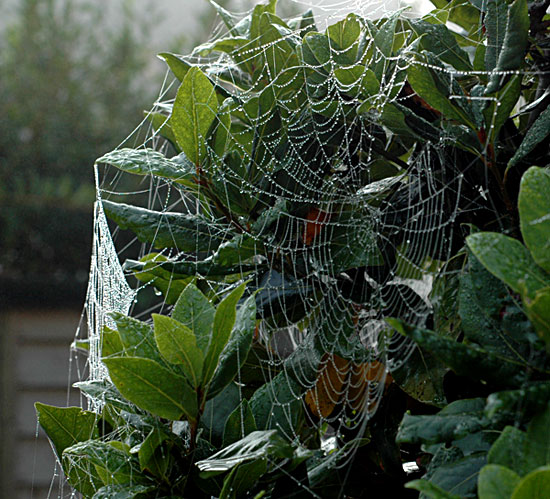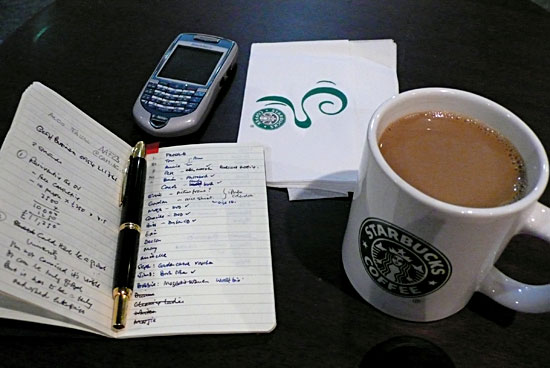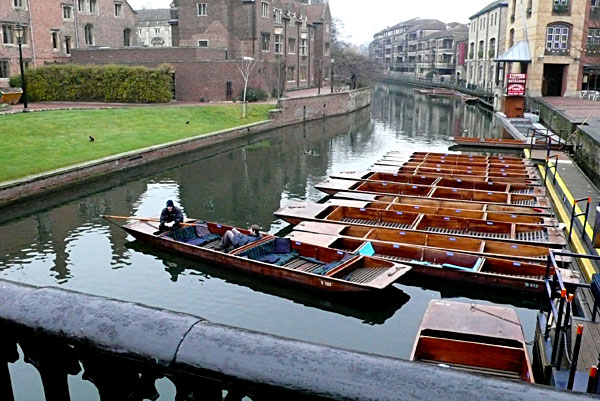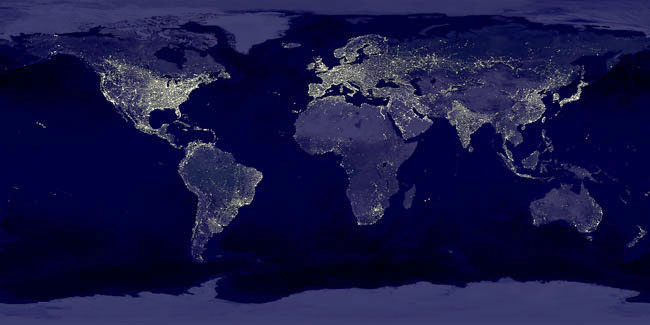
Monthly Archives: December 2006
Woven

Not quite sharp enough. Sigh. Back to drawing board.
Fog

“Fog everywhere. Fog up the river, where it flows among green aits and meadows; fog down the river, where it rolls defiled among the tiers of shipping and the waterside pollutions of a great (and dirty) city. Fog on the Essex marshes, fog on the Kentish heights. Fog creeping into the cabooses of collier-brigs; fog lying out on the yards and hovering in the rigging of great ships; fog drooping on the gunwales of barges and small boats. Fog in the eyes and throats of ancient Greenwich pensioners, wheezing by the firesides of their wards; fog in the stem and bowl of the afternoon pipe of the wrathful skipper, down in his close cabin; fog cruelly pinching the toes and fingers of his shivering little ‘prentice boy on deck. Chance people on the bridges peeping over the parapets into a nether sky of fog, with fog all round them, as if they were up in a balloon and hanging in the misty clouds…”
Charles Dickens, Bleak House.
It’s been a bit like that in East Anglia recently.
Jesus Saves…

…He’s with the Woolwich!
A street preacher and a potential believer (or perhaps a sceptic), photographed in Cambridge, on Christmas Eve.
Xmas shopping

I hate shopping. Which is why I stopped in Starbucks the other morning to review (non-existent) progress on my ‘list’.
Quote of the day
“To paraphrase an old industry saying about IBM…
Google’s not the competition, Google’s the environment.”
Rich Skrenta, co-founder and CEO of Topix.net, in a fascinating post arguing that Google’s real market share is closer to 70% than the fortysomething per cent habitually cited by market researchers.
Vista flaws begin to emerge
There’s a certain predictability about this. According to John Markoff in the New York Times…
Microsoft is facing an early crisis of confidence in the quality of its Windows Vista operating system as computer security researchers and hackers have begun to find potentially serious flaws in the system that was released to corporate customers late last month.
On Dec. 15, a Russian programmer posted a description of a flaw that makes it possible to increase a user’s privileges on all of the company’s recent operating systems, including Vista. And over the weekend a Silicon Valley computer security firm said it had notified Microsoft that it had also found that flaw, as well as five other vulnerabilities, including one serious error in the software code underlying the company’s new Internet Explorer 7 browser.
The browser flaw is particularly troubling because it potentially means that Web users could become infected with malicious software simply by visiting a booby-trapped site. That would make it possible for an attacker to inject rogue software into the Vista-based computer, according to executives at Determina, a company based in Redwood City, Calif., that sells software intended to protect against operating system and other vulnerabilities…
Planet Earth: the Santa Claus perspective
The Blair ‘legacy’
Anthony Seldon had an extraordinary piece about Tony Blair in the Guardian. The headline — “Whatever the Brownites say, history will judge Blair as a political colossus” — says it all. Andrew Rawnsley — typically — tries to have it both ways in this morning’s Observer, arguing that while Blair has been a disaster, he will get his ten years in Downing Street and thereby join a select Pantheon whose other members are Robert Walpole, Henry Pelham, Lord North, William Pitt, Lord Liverpool, William Gladstone, Lord Salisbury and Margaret Thatcher.
David Marquand has written an elegant riposte to this baloney. It reads, in part,
Iraq was not a minor peccadillo, as Seldon seems to think. It was a monumental, unmitigated disaster, for which Blair is as much to blame as Bush. The shabby tergiversations of the run-up to the war – the misuse of intelligence, the contempt for expert opinion, the disdain for international law and the collusion with the United States in shutting down the Blix investigation of alleged Iraqi WMD – were venial in comparison with the sequel. The endemic conflicts of the Middle East are more explosive than they were. Jihadist extremism is more widespread and more bloodthirsty.
Iraq itself is slithering into civil war. Iran’s rise to regional super-power status has received an enormous boost. The chances of a just settlement of the Israeli-Palestinian crisis are smaller. Innocent British civilians are in greater danger. And all of this was entirely predictable. The charge against Blair is not so much that he acted illegally and immorally (though he did) as that he hitched his wagon to a US administration of swivel-eyed fanatics, consumed by a messianic fever and utterly ignorant of the realities of one of the most complex regions in the world. It was worse than a crime. It was a blunder for which we shall pay even more dearly in future than we have already.
So why did he do it? It would take a psychiatrist to answer that question fully. But two preliminary answers stand out. The first is that the flip side of Blair’s magical persuasive abilities is, and always has been, an extraordinary capacity for self deception. As Seldon’s own biography of him shows, he has always been apt to mistake his wishes for facts. Like the great actor he is, he lives whatever part he is playing; and if reality gets in the way, so much the worse for reality. The second answer is simpler. Like many people who have been at the top for to long he has succumbed to hubris. The bad news is that nemesis has struck his country as well as himself. The good news is that a merciful release is on its way.
I plump for the second explanation. Indeed I wrote about it last year. All Prime Ministers go mad, eventually, and the longer they server, the madder they become.
A slow business day

Disconsolate punt-chauffeurs on the river Cam this morning.

